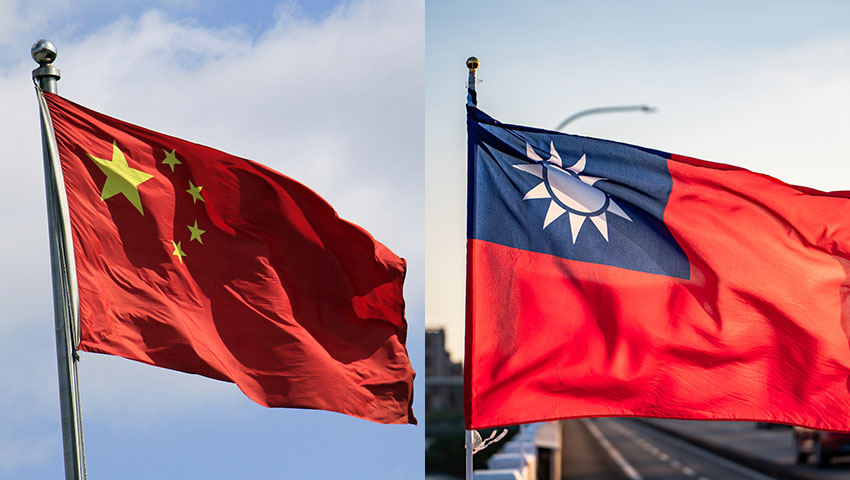What did China’s latest National People’s Council tell us about Beijing’s stance on Taiwan?
Earlier this month, Beijing hosted two sessions of the National People’s Congress (NPC) and the Chinese People’s Political Consultative Conference.
The sessions involve a public declaration of China’s political, economic, and social policy objectives, which form part of the regime’s five-year plan.
This year’s gathering involved the passing of a new law, which empowers a Beijing-backed committee to vet candidates seeking public office in Hong Kong.
The law permits the committee to directly appoint the city's legislative councillors, diminishing the power of the voting public.
The law received unanimous support from the NPC and was welcomed by Hong Kong's Chief Executive Carrie Lam, who claimed it would ensure "unpatriotic" citizens are not elected to public office.
In contrast, Western democracies, including Australia, joined pro-democracy advocates within Hong Kong in condemning the new law, which some fear may signal an end to Beijing’s commitment to a ‘One China, Two Systems’ model.
However, despite using this year’s sessions to publicly exert its influence over Hong Kong, Beijing was virtually silent on Taiwan.
Mark Harrison, senior lecturer at the University of Tasmania, noted that references to the island nation were “mostly standard” for PRC statements on Taiwan over recent years.
This is despite the recent ramp up in tensions, with the PLA repeatedly flying military jets over Taiwan’s air defence authorisation zone (ADIZ).
“That the two sessions offered established positions on Taiwan says that Beijing hasn’t made fundamental changes to its Taiwan policy but for now is still working within the existing framework,” Harrison writes in a piece published by the Australian Strategic Policy Institute (ASPI).
“By way of comparison, the NPC has in the past signalled sharp changes in Taiwan policy.”
As such, Harrison believes the absence of public statements on Taiwan suggests recent military tensions are a “tactical move within the existing framework” rather than a “fundamental strategic shift or CCP ideological reassessment”.
But Harrison warns that this does not reduce the likelihood of a crisis, noting key omissions in Premier Li Keqiang’s address.
“Within the core positions, there were pointers on the ideological structure of PRC Taiwan policy that suggested vectors of escalation,” he continues.
“It was notable that Li didn’t include a reference to ‘one country, two systems’ as Beijing’s formula for Taiwan’s future, especially since the 2019 speech President Xi Jinping gave for the 40th anniversary of the Message to compatriots in Taiwan made much of ‘one country, two systems’.
“Clearly, events in Hong Kong and Beijing’s response to them, including at this year’s NPC, call into question the meaning and use of the term, but Li did still apply it to Hong Kong, so it might be premature to say that it has been formally abandoned.”
Harrison also references remarks from PLA spokesman Wu Qian, who warned Taipei “separatists” not to “borrow strength from foreign forces”.
“These phrases are not unprecedented, but they could be used as a pretext for military action against Taiwan if Beijing were to claim that such activities had become an existential threat to ‘reunification’ and therefore to the task of the ‘great rejuvenation of the Chinese nation’,” the analyst continues.
Harrison adds that the two sessions showed no signs of compromise within the existing framework.
“Beijing remains unwilling to reach out to Taiwan’s elected government under [Tsai Ing Wen] and has not matched claims of ‘exchanges, cooperation and integrated development’ with reduced military activity in the Taiwan Strait,” he writes.
“The ideological and policy framework put in place in 1979 has failed to realise Beijing’s goals for more than 40 years, and this has created structural tension in the PRC’s Taiwan policy architecture.
“The lack of compromise is symptomatic of a system with limited mechanisms for thoroughgoing policy reassessments and an ideological belief that policy failure is a reflection only of a lack of commitment, not of a policy being in any way wrong.”
Harrison concludes by stressing the importance of international efforts to deter Chinese aggression, noting naval transits by the United States and its allies through the Taiwan Strait.
“In the absence of any signs of softening from Beijing or an abrupt change in PRC Taiwan policy and ideology, maintaining these calibrated international actions to ensure they figure in Beijing’s Taiwan policy calculus remain the best guarantor of regional security,” he writes.
Get involved with the discussion and let us know your thoughts on Australia's future role and position in the Indo-Pacific region and what you would like to see from Australia's political leaders in terms of partisan and bipartisan agenda setting in the comments section below, or get in touch with






